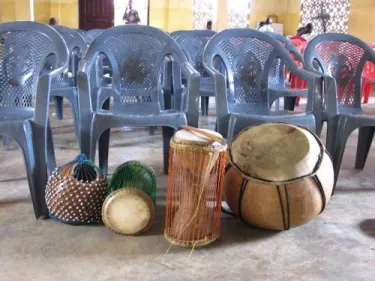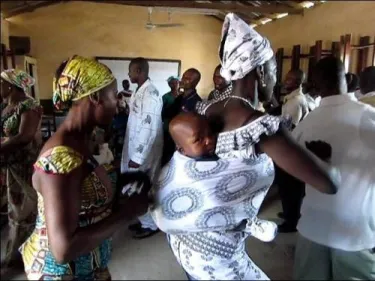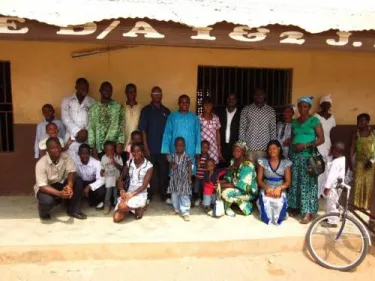Learning from Our Brothers and Sisters
A letter from Josh Heikkila, serving as Regional Liaison for West Africa, based in Ghana
Twenty-eight years ago, the Presbyterian Church of Ghana began an innovative ministry to welcome migrants from the country’s north who had moved to southern cities for school and work into the denomination’s churches. After almost three decades, the Northern Outreach Program (NOP) has flourished. It is now a ministry of 60 congregations that use nine different northern Ghanaian languages. The NOP’s inspirational story is worth telling again.
At the time the NOP was started in 1989, the south of Ghana, where the Presbyterian Church has its historic base, was overwhelmingly Christian. Upwards of 90 percent of people from the main southern ethnic groups—Twi, Ga, Fante, and Ewe language speakers—claimed a Christian identity. The north of Ghana, though, was much more diverse ethnically and religiously. Two of the larger ethnic groups had been practicing Islam for several hundred years. But in most of the smaller ones, while Christianity was making inroads, traditional African religion was still widespread.
Research done at the time the NOP was started identified these northern migrants to the south as a “Hidden Mission Field.” While some were practicing Christians and others were open to embracing the Christian faith, they didn’t always feel at home in the southern congregations. This was because they didn’t speak the languages or practice the same cultural traditions. To make them feel welcome, the Presbyterian Church of Ghana felt called to respond.
Two Presbyterian ministers from northern Ghanaian ethnic groups were appointed to get the NOP off the ground by starting preaching posts and congregations using northern languages. The Reverend Dr. Solomon Sule-Saa, who began an outreach in Ghana’s capital, Accra, now serves as the chair of the denomination’s Northern Presbytery. The Reverend Dr. John Azumah, whose work was in Ghana’s second city of Kumasi, is now a professor at Columbia Theological Seminary in Decatur, Georgia. Both have become good friends of the Presbyterian Church (USA).

I have always enjoyed attending worship at NOP congregations, because of the warm and welcoming people, the interesting theological context, and, in particular, the lively music and dance. You may witness this music and dancing for yourself by accessing the following videos on YouTube:
1. " target="_blank" rel="noopener">Dancing at the NOP congregation in Dome, Accra.
One time, while speaking with some members who were new to the Christian faith and were preparing to partake in the Lord’s Supper for the very first time, we discussed what the Apostle Paul meant in 1 Corinthians 12:28-30 when he instructs the Corinthians to examine themselves before coming to the Lord’s table:
Examine yourselves, and only then eat of the bread and drink of the cup. For all who eat and drink without discerning the body, eat and drink judgement against themselves. For this reason many of you are weak and ill, and some have died.

It was a fascinating conversation about how God has high expectations for us. While we need to approach God with fear and trembling, ultimately we know God is full of grace and mercy for us.
Coming from an American background, where there seems to be very little “fear and trembling” before the Lord, I learned so much from my interaction with these new church members who had such a strong and palpable sense of the divine presence in their lives and the world around them.
More recently, I spoke with some NOP church members who sell fruits and vegetables in the markets of Accra who talked about how they have helped people in need, and how they feel especially blessed by God when they do this. One woman spoke of how she gave away her last nice dress to someone who needed it for a special church program. Another told how she gave away her last bit of food one day to a man who was hungry and homeless and living on the street.
It was incredibly humbling for me, because I’ve never given away my last nice outfit, or my only meal, not knowing when I would receive the next. I wonder whether I could be so generous in similar circumstances.
As the NOP has thrived in the South of Ghana, the members of these congregations have felt called to spread the Good News of the Gospel in their home towns and villages in the north of Ghana, where there is often only a small Christian presence, if there is one at all. “Operation Go Back Home and Tell” is a program that encourages these migrants from the north who have become faithful church members in the south of Ghana to share their life-giving faith back in Ghana’s north.

In the south of Ghana, the NOP is now trying to run skills training programs—teaching sewing and batik-making—to improve the lives of its members economically. In the north of Ghana, the church has also established agricultural, educational, and health programs that are bringing development to that part of the country.
Without a doubt, the ministry of the Northern Outreach Program in the Presbyterian Church of Ghana is having a wonderful transformative effect. If you would like to support their work, you may do so through the Presbyterian Church of Ghana’s account with PC(USA) World Mission, designated for “Northern Outreach Program.
I am grateful for the financial support you give that allows me to be here in Ghana and to engage with and learn from our brothers and sisters in the NOP. Please take note of the enclosed letter from World Mission Director Jose Luis Casal. We thank you for this support and seek deeper commitment from you and your congregation for this work we do together.
Thank you and God bless you.
Josh
Please read this important message from Jose Luis Casal, Director, Presbyterian World Mission
Dear Friend of Presbyterian Mission,
What a joy to send this letter! As Presbyterian World Mission’s new director, I thank God for your faithful support of our mission co-workers. The enclosed newsletter celebrates the work you made possible by your prayers, engagement, and generous financial gifts. We can’t thank you enough.
After I began in April, I met with mission co-workers and global partners and was blessed to see firsthand the mighty ways God is working through them! Our global partners are asking us to help them move forward with life-changing ministries. Because of your support, we can say “yes” to these creative and exciting initiatives.
I write to invite you to make an even deeper commitment to this work. First, would you make a year-end gift for the sending and support of our mission co-workers? We need your gifts to end the year strong. With your help, we filled two new mission co-worker positions and plan to recruit for others. The needs in the world are great, and World Mission is poised to answer the call to serve.
Second, would you ask your session to add our mission co-workers to your congregation’s mission budget for 2018 and beyond? Our mission co-workers serve three-year or four-year terms. Your multi-year commitment will encourage them greatly.
Our mission co-workers are funded entirely from the special gifts of individuals and congregations like yours. Now more than ever, we need your financial support.
In faith, our mission co-workers accepted a call to mission service. In faith, World Mission sent them to work with our global partners. In faith, will you also commit to support this work with your prayers and financial gifts?
With gratitude,
Jose Luis Casal
Director
P.S. Your gift will help meet critical needs of our global partners. Thank you!
